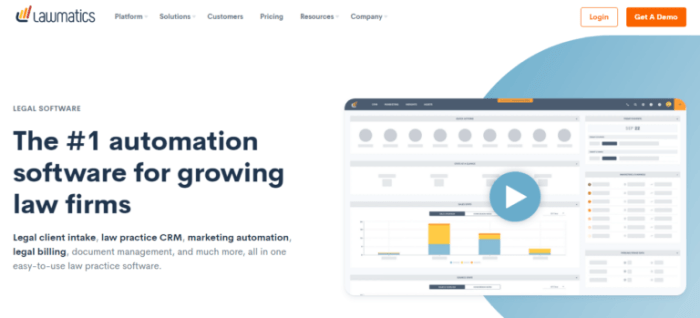Crm software for family law – The intricacies of family law demand meticulous organization and efficient communication. Juggling client files, scheduling appointments, managing deadlines, and ensuring seamless communication across multiple platforms can quickly become overwhelming. This is where a robust Customer Relationship Management (CRM) system steps in, offering a centralized hub to streamline your practice and enhance client service. This comprehensive guide delves into the benefits, features, and considerations of implementing CRM software specifically designed for family law firms.
Understanding the Needs of Family Law Practices
Family law practices face unique challenges compared to other legal specializations. Cases often involve highly sensitive personal information, demanding stringent data security measures. The emotional toll on clients necessitates personalized attention and empathetic communication. Furthermore, family law cases frequently involve complex timelines, multiple parties, and intricate legal processes, requiring efficient case management and document organization.
Key Challenges Addressed by CRM Software:
- Client Communication: Maintaining consistent and timely communication with clients, often across various channels (email, phone, text).
- Case Management: Tracking case progress, deadlines, and associated documents efficiently.
- Document Organization: Securely storing and accessing vital client documents, ensuring easy retrieval.
- Appointment Scheduling: Streamlining appointment scheduling and reminders to minimize conflicts and missed meetings.
- Data Security and Privacy: Protecting sensitive client information in compliance with relevant regulations (e.g., HIPAA, GDPR).
- Team Collaboration: Facilitating seamless communication and information sharing among legal professionals within the firm.
- Reporting and Analytics: Generating insightful reports to track key metrics, improve efficiency, and identify areas for growth.
Essential Features of a Family Law CRM
A successful CRM for family law firms should go beyond basic contact management. It needs to offer specialized features that address the unique demands of this practice area. These include:
Core Features:
- Secure Client Portal: Allowing clients secure access to their case files, documents, and communication history.
- Matter Management: Detailed case tracking with customizable fields for relevant information (e.g., case status, deadlines, involved parties).
- Document Management: Secure storage and organization of legal documents, ensuring easy retrieval and version control.
- Calendar and Scheduling: Integrated calendar for scheduling appointments, court hearings, and deadlines, with automated reminders.
- Communication Management: Centralized platform for managing emails, phone calls, and text messages, maintaining a complete communication history.
- Customizable Workflows: Automating repetitive tasks and streamlining workflows to improve efficiency.
- Time Tracking and Billing: Accurate time tracking for billing purposes, ensuring accurate invoice generation.
- Reporting and Analytics: Generating customizable reports on case progress, client interactions, and firm performance.
- Integration with other Legal Software: Seamless integration with other legal applications (e.g., case management software, e-signature tools).
- Data Security and Compliance: Robust security measures to protect sensitive client data and comply with relevant regulations.
Choosing the Right CRM for Your Family Law Practice
Selecting the appropriate CRM involves careful consideration of your firm’s specific needs and budget. Factors to consider include:
Key Considerations:, Crm software for family law
- Scalability: Choose a CRM that can adapt to your firm’s growth and evolving needs.
- User-Friendliness: Select a system that is intuitive and easy for your team to learn and use effectively.
- Cost: Evaluate the pricing model (subscription, one-time purchase) and ensure it aligns with your budget.
- Integration Capabilities: Consider the CRM’s ability to integrate with other essential software used in your practice.
- Customer Support: Ensure the vendor provides reliable and responsive customer support.
- Security Features: Prioritize a CRM with robust security measures to protect sensitive client data.
Top CRM Software Options for Family Law Firms
(Note: This section would list specific CRM software options with brief descriptions of their features and suitability for family law. Due to the dynamic nature of software offerings and avoiding endorsement, specific product names are omitted. Research current market leaders independently.)
Frequently Asked Questions (FAQs)
- Q: How much does family law CRM software cost? A: Pricing varies significantly depending on the features, number of users, and vendor. Expect a range from affordable monthly subscriptions to more expensive enterprise solutions.
- Q: Is CRM software difficult to learn? A: Many modern CRMs are designed with user-friendliness in mind. However, some may require a learning curve, depending on complexity. Look for systems with intuitive interfaces and comprehensive training resources.
- Q: Can CRM software improve client communication? A: Absolutely. A centralized communication platform allows for efficient and consistent communication with clients, improving client satisfaction and reducing misunderstandings.
- Q: How does CRM software improve case management? A: By centralizing case information, deadlines, and documents, CRM streamlines case management, reducing the risk of missed deadlines and improving overall efficiency.
- Q: What are the security implications of using CRM software? A: Choose a CRM with robust security features, including data encryption, access controls, and regular security updates, to protect sensitive client information.
Conclusion: Crm Software For Family Law
Implementing a robust CRM system is a strategic investment for any family law practice. By streamlining workflows, enhancing client communication, and improving data security, a well-chosen CRM can significantly enhance efficiency, client satisfaction, and ultimately, the success of your firm. Take the time to research available options and choose a solution that aligns with your firm’s unique needs and budget.
Call to Action
Ready to transform your family law practice? Contact us today for a free consultation to discuss your CRM needs and explore the best solutions for your firm.
FAQs
What types of data can a CRM system for family law handle?

Source: webfx.com
Family law CRMs can handle diverse data including client contact information, case details, financial records, scheduling information, communication logs, and document storage.
Is CRM software secure for handling sensitive client data?

Source: amicusattorney.com
Reputable CRM providers prioritize data security with features like encryption, access controls, and compliance with relevant data privacy regulations. It’s crucial to choose a provider with robust security measures.
How much does CRM software for family law cost?
Pricing varies widely depending on the features, number of users, and provider. Options range from affordable cloud-based solutions to more comprehensive, enterprise-level systems.
Can CRM software integrate with other legal software?
Many CRM systems offer integrations with other legal software, such as accounting packages, document management systems, and e-signature platforms, to create a unified workflow.
What are the key features to look for in a family law CRM?
Essential features include client relationship management, case management, document management, calendaring, communication tools, reporting and analytics, and robust security.
